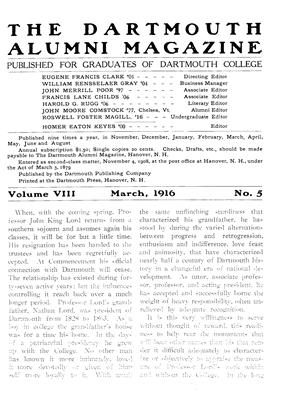by SAMUEL W. MCCALL, LL.D. '74, (New Haven: Yale University Press, 1915) Pp. 128.
This little volume constitutes the Dodge Lectures on the Responsibilities of Citizenship given at Yale in 1915. In these lectures Governor McCall has maintained the high scholarship of the distinguished men who have lectured upon the Dodge foundation. The list of these lecturers includes President Hadley, Ex-President Taft, Lord Bryce and Justice Hughes.
The Liberty of Citizenship which Mr. McCall chose as his theme has been developed by him under the following topics: Nature of Citizenship—lts Methods of Expression—Over-Government as an Enemy to Liberty; Influence of Private Enterprise upon Progress—Some Suggestions upon Government Ownership; Racial Sources of Our Liberty—The Ultimate Citizen—Various Duties—Relation of Liberty to Character; The Liberty of the Individual Under Our Constitution.
Governor McCall has been frequently described as a progressive-conservative and the views which he expresses in these lectures justify that appellation. He, however, tends strongly to the individualistic rather than the socialistic interpretation of the functions of government. His belief in individualism is shown in the statement that it is "one of the first duties of ctizenship to aid in checking the rapidity and greed with which the laws are coming to devour liberty." His position is even more clearly given when he says that the main object of the state is "to do those things which are essential to the protection and development of the individual and which in his isolation he cannot do for himself." This theory of the function of government though common two generations ago is no longer held in practice by civilized states.
The author is particularly good in the discussion of the basis and function of political parties. As might be inferred from his political philosophy he is strongly opposed to government ownership, believing that industrial progress is wholly dependent upon individual initiative. He especially deprecates what he calls paternalistic government. He admits the necessity of the combination of labor, but questions the desirability of compulsory arbitration of labor disputes.
Mr. McCall's progressivism is seen in connection with his views relating to the conservation of national resources and in his thorough belief in the ultimate triumphs of democratic institutions. He presents a most excellent brief for our federal system of government.
The book is written in a clear and entertaining style and is an excellent corrective for the extreme socialistic viewpoint advocated by so many present-day writers.
"The History of New Ipswich, New Hampshire, 1735-1914," with genealogical records of the principal families compiled and written by the late Charles Henry Chandler, 1868, with the assistance of Sarah Fiske Lee and published by the Sentinel Printing Co., of Fitchburg, Mass., Ts a book of 782 pages that will be of value to the person interested in local New Hampshire History. As 551 pages of this book are devoted to the genealogy of New Ipswich families, this book will also be of great service to the student interested in genealogical research.
"The Survival of the Unfit; Powers, Principles and Practice in Man-Making," by Philip Wendall Crannell, D.D., '82, has recently been published by George H. Doran Co., New York City. The chapters in this book by Dr. Crannell, President of Kansas City Baptist Theological Seminary, were originally published as editorials in the SundaySchool Times. They are expositions of one central theme: "the development and operation of character under the hand of God through the faith and work of the Christian in his three-fold relationship,—to God, to himself, and to his fellows."
Lewis H. Haney '03 is the author of "Joint Costs with Especial Regards to Railways," in the February number of the Quarterly Journal of Economics.
Rev. Charles Caverno '54 is the author of "Louis Agassiz and Charles Darwin; a Synthesis" reprinted from the January number of Bibliotheca Sacra.
"Pan Americanism and the Pan-American Union," by Hon. John Barrett '89 appears in Case and, Comment for January. The Georgetown College Journal for November, 1915, contains an interview with Mr. Barrett in which he expresses at length his views on the Monroe Doctrine.
"The Mettle of New Hampshire" by Professor Fred L. Pattee '88 appears in the Granite State Monthly for January.
The Bruno Chap Book for January consists of seventeen war poems, entitled "The Red Shame" by H. Thompson Rich '15.
 View Full Issue
View Full Issue
More From This Issue
-
 Article
ArticleALONG THE OUTING CLUB TRAIL ON SKIS
March 1916 By Fred H. Harris '11 -
 Article
ArticleSOME LETTERS OF NATHAN SMITH
March 1916 -
 Article
ArticleTHE FEBRUARY MEETING OF THE TRUSTEES
March 1916 -
 Article
ArticleEXHIBITION OF CORNISH ARTISTS
March 1916 By George Breed Zug -
 Class Notes
Class NotesLOCAL ASSOCIATIONS
March 1916 -
 Article
ArticleWhen, with the coming spring, Professor John King Lord returns
March 1916
Books
-
 Books
BooksPOLICIES UNDERLYING CORPORATE GIVING.
JULY 1967 By DAVID T. ECKELS '44 -
 Books
BooksTHE FRENCH REVOLUTION
February 1933 By Frank Maloy Anderson -
 Books
BooksPSYCHOPHYSICAL ANALYSIS OF VISUAL SPACE
JULY 1971 By HIROSHI ONO '60 -
 Books
BooksWINE AND YOU.
OCTOBER 1970 By John Hurd ’21 -
 Books
BooksLOGIC AND SCIENTIFIC METHODS
June 1948 By Maurice Picard -
 Books
BooksELEMENTARY THEORY OP FINITE GROUPS.
February, 1931 By Robin Robinson


